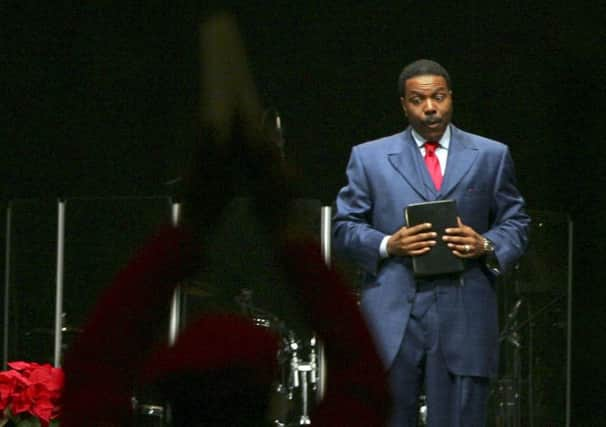Martyn McLaughlin: US televangelist Creflo Dollar preys on the poor


The predatory ruse otherwise known as televangelism is a phenomenon largely confined to the other side of the Atlantic. The fit seems natural. The US is a country of two unwavering faiths; in God and money. Those able to meld the two have reaped the reward.
In Scotland, this presence has been largely restricted to the boondocks of the electronic programme guide, where pastors with producers offer up their raptorial charms. The sermons, grainy, gaudy affairs urging viewers to donate via telephone hotlines, are sandwiched between the advertorials of home channels, where overdeveloped failed actors called Brad extol the uncertain virtues of wooden knife blocks to the sleepless and hopeless.
Advertisement
Hide AdAdvertisement
Hide AdKnife blocks at least serve a purpose. The televangelists, by contrast, serve only themselves. Take Creflo Dollar, a man with the name of a rapper, the patter of a Barras stallholder and the wardrobe of Arthur Daley. Next month, he will pack up his jamboree and take it to Scotland for a nationwide tour, stopping off at the Aberdeen Exhibition and Conference Centre, Glasgow’s Clyde Auditorium and Destiny Church Gorgie in Edinburgh.
“The grace of God has so much to offer you,” he explains in a YouTube video promoting the tour. “But if we can understand what Jesus has done through his blood, we will never be the same again.” Lest he be mistaken for an amateur haematologist, Dollar gets to the gist: “I believe God will move in a mighty way and you will receive an abundance of undeserved favour.”
The rhetoric, a brazen demand for money clothed in the language of the Bible, follows a dishonourable tradition stretching back decades. The so-called prosperity gospel movement took root in the 1970s when proponents such as Oral Roberts, Frederick Price and Kenneth Copeland used television to fleece their flock. Their message teaches that God promises wealth to the faithful; those who “tithe”, or give around 10 per cent of their income to the church.
This heresy has prospered handsomely ever since. Copeland, as much a CEO as pastor, presides over a ministry with a call centre at its Texas headquarters staffed by nearly 500 people. It fields 60,000 so-called prayer requests every month from people in the 134 countries around the world where his broadcasts are shown. As befits his perversion of faith, Copeland proudly boasts of being a billionaire. The exact figures are hard to pin down, but it is thought his operation has an annual income of around £70m.
With a personal fortune of around £18m, Dollar’s largesse is modest only in comparison to his fellow ringmasters, but he has shown a particular flair for exploitation. Only last year, he asked the 200,000 members of his World Changers Church International ministry to shell out £200 apiece for a luxury Gulfstream G650 jet, an extravagance Dollar deemed “necessary” in order to “blanket the globe with the gospel of grace”. A mission interspersed, no doubt, with pit stops in Hawaii and the Caribbean; growing faith is hard work.
When he touches down in Scotland, the Georgia-born pastor may discover a stern challenge in wait from a nation with a hereditary resistance to razzle dazzle. He may wish to pitch his fundraising crusade a little lower, by asking for the traditional 20p for the bus to East Kilbride, for instance.
But the temptation to laugh off the arrival of his repugnant sideshow should be resisted. In the US, a faltering economy and grinding poverty have only served only to boost the coffers of those who preach the prosperity gospel. Its followers have lost everything but their faith and view its exponents as their last hope.
Assuming the same will not be true here smacks of misplaced confidence. At a time when growing numbers of people have a deeply held mistrust of the banking system, such opportunism poses a threat to the vulnerable, and Dollar knows they are part of a sizeable minority. After all, look at the size of the venues he will be addressing – the Clyde Auditorium alone can accommodate 3,000 souls.
Advertisement
Hide AdAdvertisement
Hide AdDollar’s visit to these shores has been low profile and this in part explains why the criticism from faith leaders has been thin on the ground. Only David Robertson, the Moderator of the Free Church of Scotland, has spoken out, describing Dollar’s doctrine as “blasphemous”. If it is the wish of every church to re-engage with the public to halt their dwindling influence, they could do far worse than following suit. The Church of Scotland has done commendable work to address the poverty that feeds the bank accounts of those like Dollar, spearheading the Churches’ Mutual Credit Union and the Poverty Truth Commission. But it can ill afford to be complacent.
The Catholic Church, meanwhile, has been indolent on this issue to the point of obsolescence. Nearly three years have passed since the consecration of Archbishop Leo Cushley, yet what message of note has he sent since from the comforts of his listed Morningside mansion that might offer hope to the descendants of the poor who helped build his church?
The likes of Dollar thrive in the nooks and crannies of society where the desperate feel alone, deserted by hope. The bounty he seeks will hit ordinary Scots hard, but it will leave all of us poorer.